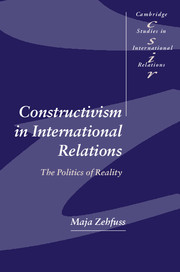Book contents
- Frontmatter
- Contents
- Acknowledgements
- List of abbreviations
- 1 Introduction
- 2 Identity change? Wendt's constructivism and German military involvement abroad
- 3 Intersubjectivity and the normative: Kratochwil's constructivism and German military involvement abroad
- 4 Words and world: Onuf's constructivism and German military involvement abroad
- 5 The politics of ‘reality’: Derrida's subversions, constructivism and German military involvement abroad
- 6 The politics of constructivism
- Bibliography
- Index
- CAMBRIDGE STUDIES IN INTERNATIONAL RELATIONS
3 - Intersubjectivity and the normative: Kratochwil's constructivism and German military involvement abroad
Published online by Cambridge University Press: 22 September 2009
- Frontmatter
- Contents
- Acknowledgements
- List of abbreviations
- 1 Introduction
- 2 Identity change? Wendt's constructivism and German military involvement abroad
- 3 Intersubjectivity and the normative: Kratochwil's constructivism and German military involvement abroad
- 4 Words and world: Onuf's constructivism and German military involvement abroad
- 5 The politics of ‘reality’: Derrida's subversions, constructivism and German military involvement abroad
- 6 The politics of constructivism
- Bibliography
- Index
- CAMBRIDGE STUDIES IN INTERNATIONAL RELATIONS
Summary
Friedrich Kratochwil makes a complex argument about the role of rules and reasoning in international relations in order to bring the normative back in. His constructivism develops out of two related but nevertheless distinct strands. On the one hand, Kratochwil expresses dissatisfaction with the epistemological stance in (traditional) IR theory. Its reliance on positivism and resulting conception of objective science, he argues, exclude consideration of the normative character of politics. On the other hand, and flowing from this, is his preoccupation with the role of rules and norms in political life and its analysis. His key claim can be seen to lie in the assertion that international politics must be analysed in the context of norms properly understood.
Kratochwil's constructivist position is explicitly stated in ‘Understanding Change in International Politics’, an article he co-authored with Rey Koslowski. They see constructivism as centring on practices which are based on rules and norms. According to Koslowski and Kratochwil, all political systems are remade or changed through actors' practices. Thus, ‘[f]undamental change of the international system occurs when actors, through their practices, change the rules and norms constitutive of international interaction.’ As practices on the international level depend on practices on the domestic level, such changes ‘occur when beliefs and identities of domestic actors are altered thereby also altering rules and norms that are constitutive of their political practices’.
- Type
- Chapter
- Information
- Constructivism in International RelationsThe Politics of Reality, pp. 94 - 150Publisher: Cambridge University PressPrint publication year: 2002

